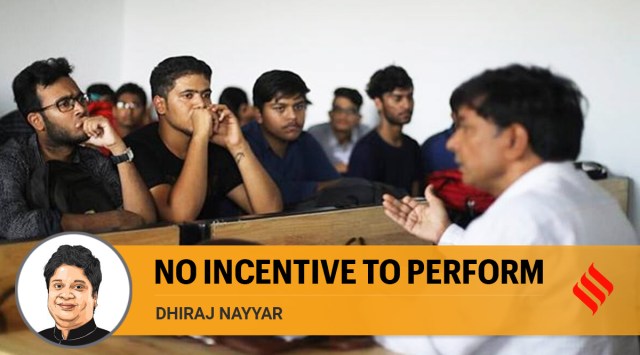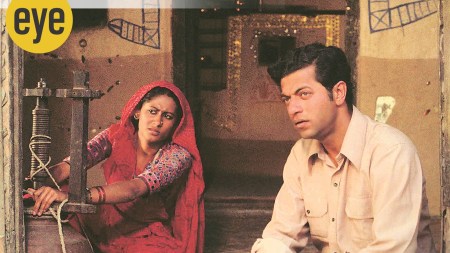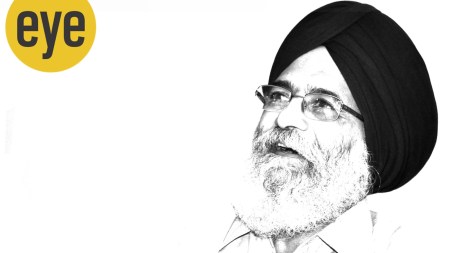- India
- International
Dhiraj Nayyar writes: The problem with putting the civil services on a pedestal
Dhiraj Nayyar writes: All civil servants operate in a system of limited accountability with few incentives to perform and plenty of opportunities to use and abuse their powers.
 To help such budding civil service aspirants pursue their dream, many private and government led/funded institutions provide free civil services coaching to aspirants. (Express File Photo: Abhinav Saha)
To help such budding civil service aspirants pursue their dream, many private and government led/funded institutions provide free civil services coaching to aspirants. (Express File Photo: Abhinav Saha)India has a complicated, love-hate relationship with its bureaucracy. Recently, two babus of the elite IAS were the subject of widespread public derision when an investigation by this newspaper revealed that one of them had ordered that a government stadium in the national capital be emptied in order to walk their pet dog. A week later, the media and the public feted those who had successfully cracked the UPSC examination in order to become bureaucrats of the future. Most countries in the world have a cadre of professional civil servants but nowhere are new entrants to the system of government celebrated like in India. It’s like the public itself hasn’t overcome the colonial legacy of the civil service being the grandest of professions. This has consequences.
The fact is that, 75 years after independence and 30 years after liberalisation, there is still an overhang of the all-powerful, all-pervasive state. The fact also is that despite grumbling and complaining about the difficulty of dealing with the government, the people of India put on the highest pedestal the very personnel responsible for it. Dissatisfaction is channelled towards politicians who can be voted out of office every five years. But the bureaucracy is permanent. Interestingly, most ordinary people don’t aspire for themselves or their children to join politics which is viewed as murky, the domain of the less-educated non-professionals. But the civil services are highly aspirational.
There are good reasons for a favourable view of the civil services. For one, candidates are selected on merit based on an open examination and interview. One cannot inherit a position in the civil services, like in politics. Then there is the job security that comes with gaining entry. Unless a civil servant does an extraordinary wrong, she has a job for life, and steady, time-bound promotions which ensure that everyone retires at the top irrespective of performance. However, in the perceived strengths of the civil services lie its weaknesses.
The single UPSC examination, which most candidates take in their early or mid-20s, is treated as gospel. Often, it is used as an argument against lateral entry because unless people have passed that examination, they are deemed to not be meritorious or deserving of being in government. It is also used to determine career trajectories. Those who stood first or second in their batch while in their 20s are more likely to rise to important positions such as cabinet secretary or foreign secretary thirty years later when they are in their late 50s. Merit and competence cannot be judged by a single exam.
The permanence of the job is a problem too. Punishment for over-reach or misuse of power is a transfer, either from a weightier ministry to a lighter one or from high-profile capitals to geographically remote ones. The two IAS officers responsible for the stadium episode have not lost any seniority, salary or status for their transgression. They have just been moved out of the public eye. Eventually, they will find their way back. Some years ago, there was a widely reported case of an Indian Foreign Service officer based in New York who had “misbehaved” with a flight attendant. His punishment was being recalled to the headquarters in Delhi. Now, presumably exonerated of any serious offence, he is an ambassador to a foreign country. Punishments for such transgressions are more severe and long lasting in the private sector. Even in politics, scandal-hit ministers don’t get transfers; they get the sack.

The result is that all civil servants, never mind their ability or competence, operate in a system of limited accountability with few incentives to perform and plenty of opportunities to use and abuse their powers. Those who do good work do so despite the system.
The civil services system needs to be brought down from its pedestal and placed at par with every other profession like elsewhere in the world. This will not happen via political diktat. It requires the weight of public opinion. The system must be manned by capable, competent individuals. This cannot be decided on the basis of one exam. The bad eggs need to be separated which cannot happen when the job is for life. It may sound radical for India’s civil services but that is the way the rest of India and the world function, including the UK from where we inherited the structure. The best and brightest will be celebrated. They will be given Padma and other awards. And there will be no high-handed babus to deride. India will get the government it needs for the 21st century.
This column first appeared in the print edition on June 8, 2022 under the title ‘No incentive to perform’. The writer is chief economist, Vedanta and was formerly OSD & Head, Economics, Finance & Commerce, NITI Aayog.
40 Years Ago
EXPRESS OPINION
More Explained
May 19: Latest News
- 01
- 02
- 03
- 04
- 05








































